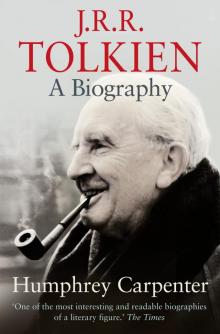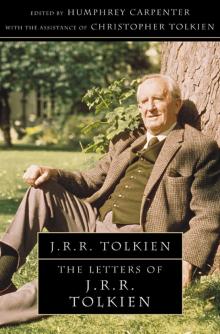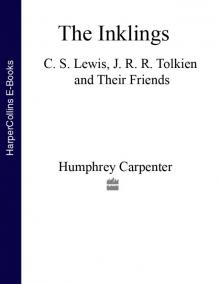- Home
- Humphrey Carpenter
The Inklings
The Inklings Read online
The Inklings
C. S. Lewis, J. R. R. Tolkien,
Charles Williams and their friends
Humphrey Carpenter
COPYRIGHT
HarperCollinsPublishers Ltd.
1 London Bridge Street
London SE1 9GF
www.harpercollins.co.uk
This edition 2006
First published in Great Britain by George Allen and Unwin 1978
Copyright © George Allen and Unwin (Publishers) Ltd 1978, 1981
Humphrey Carpenter asserts the moral right to be identified as the author of this work.
A catalogue record for this book is available from the British Library
All rights reserved under International and Pan-American Copyright Conventions. By payment of the required fees, you have been granted the non-exclusive, non-transferable right to access and read the text of this ebook on screen. No part of this text may be reproduced, transmitted, down-loaded, decompiled, reverse engineered, or stored in or introduced into any information storage and retrieval system, in any form or by any means, whether electronic or mechanical, now known or hereinafter invented, without the express written permission of HarperCollins ebooks
HarperCollinsPublishers has made every reasonable effort to ensure that any picture content and written content in this ebook has been included or removed in accordance with the contractual and technological constraints in operation at the time of publication
Source ISBN: 9780007748693
Ebook Edition © MAY 2017 ISBN: 9780007381241
Version: 2017-05-12
Signatures of some of the Inklings, sent to Dr Warfield M. Firor in 1948, after he had given them a ham (by permission of the Trustees of C.S. Lewis)
DEDICATION
Dedicated to the memory of
the late Major W. H. Lewis
(‘Warnie’)
CONTENTS
Cover
Title Page
Copyright
Dedication
Preface
Part One
1‘Oh for the people who speak one’s own language’
2‘What? You too?’
3Mythopoeia
4‘The sort of thing a man might say’
Part Two
1C.W.
2‘A tremendous flow of words’
Part Three
1‘They are good for my mind’
2‘We had nothing to say to one another’
3Thursday evenings
4‘A fox that isn’t there’
5‘Hwæt! we Inclinga’
Part Four
1‘No one turned up’
2Till We Have Faces
Keep Reading
Appendices
ABiographical notes
BBibliography
CSources of quotations
DAcknowledgements
Notes
Index
About the Author
About the Publisher
PREFACE
C. S. Lewis died in 1963, J. R. R. Tolkien in 1973, Charles Williams in 1945. In recent years the books of the first two have been immensely popular on both sides of the Atlantic, while Williams, though his name is far less well known, continues to exercise a considerable fascination to those who have encountered his writings.
These three men knew each other well. Lewis and Tolkien met in 1926 and soon achieved an intimacy which lasted for many years. Around them gathered a group of friends, many of them Oxford dons, who referred to themselves informally and half jestingly as ‘The Inklings’. When in 1939 Charles Williams found himself obliged to move from London to Oxford he was quickly taken into this circle, and was on close terms with Lewis and the others until his death.
The Inklings achieved a certain fame – or even notoriety, for they had their detractors – during the lifetime of the group. And when some years later it was noted that The Lord of the Rings, The Screwtape Letters, and All Hallows’ Eve (to name but three of many books) had this in common, that they were first read aloud to the Inklings, it became something of a fashion to study the writings of Lewis, Tolkien, and Williams on the assumption that they were members of a clearly defined literary group with a common aim. Such an assumption may or may not stand up to serious investigation. But in the meanwhile there has been no attempt to write any collective biography of the Inklings. This book tries to fill that gap.
It is based largely on unpublished material, and I am much in the debt of the various people who have made this material available to me. My acknowledgements to them and to the many others who have helped me will be found in Appendix D. As to quotations, their sources are fully identified in Appendix C, by a system which I feel is less intrusive than the conventional method of numerals referring to notes.
The book is largely concerned with C. S. Lewis; for, as I have argued in it, the Inklings owed their existence as a group almost entirely to him. I have also given an account, necessarily highly compressed, of the life and writings of Charles Williams. Of J. R. R. Tolkien’s life and work outside the Inklings I have said very little, because he has been the subject of an earlier book of mine, to which I have little to add.
I have tried to show the ways in which the ideas and interests of the Inklings contrasted sharply with the general intellectual and literary spirit of the nineteen-twenties and thirties. This has necessitated some discussion of their writings, particularly Lewis’s. In this sense the book sometimes strays from ‘pure’ biography into literary criticism. But I have deliberately avoided making any general judgement of these men’s achievement, for I think it is too early to try to do so. I have merely tried to tell their story.
H.C.
Oxford, 1978.
‘O my heart, it is all a very odd life.’
Charles Williams in a letter to his wife, 12 March 1940
PART ONE
1
‘Oh for the people who speak one’s own language’
From the nursery window of the big house there could be seen a line of long, low mountains. Often the view was blurred by a slight mist, for the weather was generally damp, and on many days the sight of the hills was shut out entirely by slanting rain. Then, all that the boy could see were the wet fields that sloped down towards Belfast, where the tall cranes marked the shipyards whose hum could be heard even at this distance.
Even on wet days there was plenty to be done. Outside the nursery door were long upstairs corridors, attics to be explored, games to be played among the gurgling water-tanks where the wind blew under the slates. Or if the boy tired of that, there were pictures to be drawn and stories to be invented, and his diary of the holiday to be written up.
‘My Life during the Exmas Holydays of 1907, by Jacks or Clive Lewis. Author of “Building of the promenad”, “Toyland”, “Living races of mouse-land” etc. I begin my life after my 9th birthday. On which I got a book from Papy and a post card album from Mamy. Warnie (my brother) was coming home and I was looking forward to him and the Xmas holydays.’
The boy had been christened Clive, but he always called himself Jacks or Jack. His brother Warnie, whose real name was Warren, was three years older than him, and went to a boarding-school in England. Jack always looked forward to Warnie’s return, because then they could paint pictures together or make up stories. Warnie liked stories about steamships and trains and India, while Jack liked to write about animals who did heroic deeds. But they usually managed to fit all this into the same story. While Warnie was away at school, Jack carried on with the stories by himself, when he was not learning things from Miss Harper, his governess, or from his mother, who taught him French and Latin.
‘Mamy is like most middle-aged ladys, stout, brown hair, spectaciles, kniting her cheif industry et
c. etc. Papy of course is the master of the house, and a man in whom you can see strong Lewis features, bad temper, very sensible, nice wen not in a temper. I am like most boys of 9 and I am like Papy, bad temper, thick lips, thin, and generaly weraing a jersey.’
His father, who worked as a solicitor in Belfast, was changeable in mood, and Jack felt more comfortable with his mother, who behaved in the same calm affectionate way all the time. On the other hand it was his father who had bought all the hundreds of books which lined the study and the drawing-room and the cloakroom, and were stacked two deep in the landing bookcase, and filled the corridors and the bedrooms. Jack turned the pages of most of them in turn. One day he found these lines in a book of poetry by Longfellow:
I heard a voice that cried
Balder the beautiful
Is dead, dead.
He had never heard of Balder, but the words gave him an extraordinary feeling, a notion of great cold expanses of northern sky. He could not understand exactly what he felt, and the more he tried to recapture the feeling the more it slipped away.
There were lots of other books to read: the Beatrix Potter tales, Gulliver’s Travels in a big illustrated volume, and stories by Conan Doyle and Mark Twain and E. Nesbit. In the summer there were picnics on the hills and days by the sea, and there was always something to be done in the big house; so that the time passed quickly in a steady humdrum happiness.
Then one night not very long after his ninth birthday he woke with a headache, and when he cried, his mother did not come to him. There were lights in her room and a bustle of doctors and nurses. She had cancer. Jack prayed that God would make her better, but she went on being ill. On the day she died, the calendar in her room (which had a Shakespearian quotation for each day) bore the words: Men must endure their going hence, even as their coming hither. After that, everything changed. Jack would still have moments of happiness, but the old unshakeable comfort had gone. As he himself said, ‘It was sea and islands now. The great continent had sunk like Atlantis.’
First came the discomfort of being crammed into Eton collar, knickerbockers and bowler hat; then the clop clop of the four-wheeler driving him and his brother to the quay in Belfast; then the sea crossing, followed by his first sight of England, which seemed a sadly flat landscape after the Irish hills; then school.
Wynyard School in Hertfordshire had been moderately good when Warnie was first sent there, but by the time Jack joined his elder brother it was deteriorating as its headmaster became insane. For the next two years Jack had to endure grossly incompetent teaching, bad food, stinking sanitation, arbitrarily inflicted beatings and perpetual fear. It was a terrible introduction to the outer world, and its only good result was to drive the two brothers closer together for mutual protection. By the time the school finally collapsed and the headmaster was certified mad, Warnie had already moved on to Malvern College; the younger boy was sent briefly to a school in Belfast, then to another in England.
Meanwhile Jack continued to read voraciously. He had discovered most of the English poets by the time he was fifteen. He found The Faerie Queene in a big illustrated edition and loved it. He was delighted by the romances of William Morris. Best of all, one day he chanced across an Arthur Rackham illustration to Siegfried and the Twilight of the Gods, and felt the same sensation as he had known when he first read the Longfellow lines about Balder. ‘Pure “Northernness” engulfed me,’ he said; and he began a quest for everything ‘Northern’. Books of Norse myths, a synopsis of the Ring operas, Wagner’s music itself, all were food to his imagination. Soon he was writing his own poem on the Nibelung story, rhyming ‘Mime’ with ‘time’ and ‘Alberich’ with ‘ditch’ because he knew no better. He worked hard at his school-books, too, showing considerable aptitude for Latin and Greek. Yet there was no sense of stability, no ultimate feeling of safety, neither in the school term nor at home during the holidays, when even his brother’s companionship could not entirely lighten the oppressiveness of the big house, with its stuffy routine now dictated entirely by his father.
At the age of fourteen he won a classical scholarship to Malvern College.
*
‘Not only does this persecution get harder to bear as time goes on, but it is actually getting more severe.’ Fifteen-year-old Jack Lewis was writing home to his father from Malvern. ‘All the prefects detest me and lose no opportunity of venting their spite. Today, for not being able to find a cap which one gentleman wanted, I have been sentenced to clean his boots every day after breakfast for a week. It is after breakfast that the form goes through their translation together. From this I am cut off. When I asked if I might clean them in the evening (an arrangement which you observe would have made no difference to him), I received a refusal, strengthened by being kicked downstairs. So we go on.’
Malvern was no worse than most English public schools of the time, but it was no better. Warnie had been happy there – he left just as Jack arrived – but the elder boy was, at this stage in their lives, the more resilient. Jack almost immediately took a dislike to the place. It was not that the teaching was bad: far from it, for he was encouraged by a first-rate form master and was commended for excellent work. But academic study and the opportunity to read books seemed to play such a small part in the life of the place. Almost all the day it was bells ringing, feet running, shouted commands from older boys, little sleep and no privacy. Two things in particular alarmed him. One was homosexuality, especially the flirtations of the older boys with the younger. The other was the fact that Malvern, like many other public schools, was run not so much by the staff as by an unofficial clique of senior boys called ‘the Bloods’. Admission to this clique was not through formal qualification, but through being ‘the right sort of person’ and knowing ‘the right people’. Moreover once a senior boy became a Blood he had considerable power over his fellows. Bloods who had any tendency to be bullies would pick on those who showed resentment of their power. Jack Lewis did show such resentment. He was soon selected as an ideal victim, and after just two terms of persecution he had seen enough. What he was going through was no worse than what thousands of other boys at English public schools were enduring, but he had no intention of staying firm and enduring it. He was not that sort of person. When faced with something he hated, he did not tolerate it but went to war on it. And since he could not take on the Malvern Bloods single-handed he decided that he had better get away. He wrote to his father: ‘Please take me out of this, as soon as possible.’
His father, a man of peculiarly disjointed thinking, was usually notable for making the wrong decisions. But for once he did the right thing. He removed Jack from Malvern and sent him to the man who had been his own headmaster, and who was now retired in Surrey and taking one or two private pupils. W. T. Kirkpatrick, tall and muscularly lean, was a strict atheist who nevertheless put on his best suit to dig the garden on Sunday. This, however, was his only recorded piece of illogical behaviour: in every other particular his life was ruled by strictly rational principles. He was fearsome in conversation, for no sentence passed his lips that was not ruthlessly logical. When Jack Lewis first met his new teacher on arrival at the railway station, the boy attempted some small talk, remarking that the Surrey countryside was more wild than he had expected. ‘Stop!’ shouted Kirkpatrick. ‘What do you mean by wildness, and what grounds had you for not expecting it?’ Jack did his best, but answer after answer was rejected as being the product of inadequate thought. ‘Do you not see’, Kirkpatrick concluded, ‘that your remark was meaningless?’
Under the tuition of ‘Kirk’ in the two years that followed, the boy learnt to phrase all remarks as logical propositions and to defend his opinions by argument. Not that ‘opinion’ was a term admissible in that household. ‘I have’, Kirkpatrick would exclaim with raised hands, ‘no opinion on any subject whatsoever.’
Soon, Jack Lewis was learning to match his teacher’s mind with dialects of his own, especially in his letters to a Belfast friend, Arthur Gre
eves, who was prone to vague and illogical statements and who in consequence found himself on the receiving end of Kirk-like arguments. Greeves adhered to the religious beliefs of his childhood, and when he mentioned this in a letter to Lewis there came back a tirade. ‘I had thought that you were gradually being emancipated from the old beliefs,’ Lewis declared. ‘You know, I think, that I believe in no religion. There is absolutely no proof for any of them, and from a philosophical standpoint Christianity is not even the best. All religions, that is all mythologies to give them their proper name, are merely man’s own invention – Christ as much as Loki.’ And Lewis offered his own interpretation of Christianity: ‘After the death of a Hebrew prophet Yesua (whose name we have corrupted into Jesus), he became regarded as a god, a cult sprang up, which was afterwards connected with the ancient Hebrew Jahweh-worship, and so Christianity came into being – one mythology among many.’
This atheism was in fact not the result of Kirkpatrick’s teaching. Knowledge of his tutor’s opinions and access to the rationalist books in the house did encourage Jack, but he had begun to abandon religious belief some years earlier, partly because he found it impossible to make his prayers sincere, partly because he did not think that Christianity had much relation to the largely unhappy world around him, and partly because the Bible did not appeal to him as a story. Or rather, it was when reading pagan stories, especially the myths of the Norsemen, that he experienced his most profound sensations of delight. He began to write a tragedy about the Norse gods. It was in Greek form, under the title ‘Loki Bound’, and it was an attempt to express both the appeal of Northern myth and his contempt for the Christian view of the universe; for in the play Loki sets himself in opposition to Odin the creator of the world, declaring that such creation was wanton cruelty. Lewis also wrote short poems on this theme, picturing God as a brutish force whose hatred has scarred men’s lives.

 J. R. R. Tolkien
J. R. R. Tolkien Mr Majeika and the School Caretaker
Mr Majeika and the School Caretaker Mr Majeika Joins the Circus
Mr Majeika Joins the Circus Mr Majeika on the Internet
Mr Majeika on the Internet Mr Majeika and the Ghost Train
Mr Majeika and the Ghost Train Mr Majeika and the Lost Spell Book
Mr Majeika and the Lost Spell Book Mr Majeika and the School Book Week
Mr Majeika and the School Book Week The Letters of J.R.R. Tolkien
The Letters of J.R.R. Tolkien Mr Majeika and the School Inspector
Mr Majeika and the School Inspector Mr Majeika and the Music Teacher
Mr Majeika and the Music Teacher The Inklings
The Inklings Mr Majeika and the School Trip
Mr Majeika and the School Trip Mr Majeika and the Dinner Lady
Mr Majeika and the Dinner Lady Mr Majeika and the School Play
Mr Majeika and the School Play